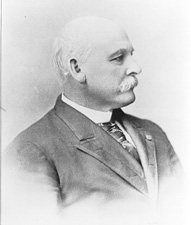
 |
After the war he was again in the mercantile business. He took a stock of goods to Virginia City, Mont., in 1866, and maintained a store for a short time but later in the year moved on to help found Salmon, Idaho, which he thenceforth claimed as his home. Here he was married in January 1868 to Lena Darnutzer, of Swiss descent. Three sons and three daughters were born to them. Here, also, a political career began with his appointment as commissioner to organize Lemhi County, from which, in 1874, he was elected to the territorial legislature. In 1878 he was a member of the territorial council, and in the eighties served on the Republican National Committee for Idaho. He represented Idaho at the cotton centennial at New Orleans in 1884 where he spent $35,000 of his own money to advertise the resources of Idaho. President Harrison appointed him governor of the territory of Idaho on Apr. 1, 1889. He at once repeated a call issued by his predecessor for a constitutional convention which met on July 4, 1889. When the document was finished, Shoup accompanied it to Washington to work for its ratification by Congress. In the elections that followed ratification he became governor of Idaho. The metamorphosis of Idaho from territory to state then absorbed him. He called the legislature to meet in December 1890, and was elected by this body to be the first United States senator from Idaho.
His policy in the Senate was to give a general support to all Republican measures, and a special support to those dealing with the welfare of his state. He opposed the repeal of the "purchasing clause" in the Sherman silver bill by one of his two notable speeches in the Senate, and then supported the Republican measure in 1900 to establish the gold standard (Congressional Record, 53 Cong., 1 Sess., pt. II, p. 1440; 56 Cong., 1 Sess., pt. II, p. 1825). He was an opponent of "free silver" in spite of the fact that Idaho was a great producer of that metal. His great interest in the territories brought him the position as chairman of the Committee on Territories, member of committees on Military Affairs, Indian Affairs, Indian Depredations, Pensions, and Education. He advocated a liberal and just treatment of the Indians, was a firm believer in a liberal pension law and introduced many of the personal bills that President Cleveland vetoed. He believed in the popular election of United States senators. He held his place in the Senate continuously for ten years, being defeated in 1901, probably because of his stand on the silver question. He died December 21, 1904 at Boise, Idaho. His statue was placed in Statuary Hall at the national capitol by his state in 1910.
text by J. E. Retherford, Dictionary of American Biography